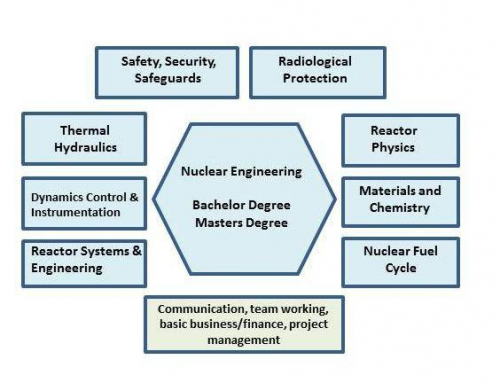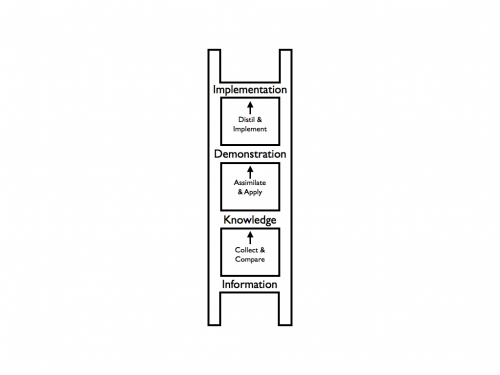Educational programme
Definition
A set of organized and purposeful learning experiences with a minimum duration of one school-year (or academic year), usually offered in an educational institution
Description
An example: University programmes in nuclear engineering
Engineering education has been offered for many decades along several different tracks. One approach is to have two levels in the academic education: the Bachelor’s, or undergraduate degree, based on approximately three to four years of study at the university level and a more advanced degree, the Master’s, which involves one or two years of study beyond the Bachelor’s. Another approach that has been widely used, especially in Europe, is the Diploma. It typically involves five years of study. A third approach is the Engineer degree consisting of five to six years of study. This has been the tradition in, for example, France, Russian Federation and the Ukraine. This picture is, however, changing. In June 1999, the Ministers of Education in the European Union entered into the Bologna Process (The Bologna Process is a series of ministerial meetings and agreements between European countries designed to ensure comparability in the standards and quality of higher education qualifications. Visit [1] for more details). This has led to the adoption of the Bachelor’s and Master’s degree programmes at most European universities, which replace the Diploma or the Engineer degree. France focuses the nuclear engineering education either at the Engineer degree (five years usually, six years in some instances) within its specific ‘Grandes Ecoles’ approach, or as a Master’s degree (five years) in harmony with the Bologna Process. Russian Federation is taking a two-tier approach in which the Bachelor’s/Master’s programmes will be implemented. This is a key part of the strategy for international engagement. However, the degree of Engineer will be retained in Russian Federation and Ukraine to satisfy the needs of the domestic industry.
Engineering education is country and region dependent. There is no unique model and it is important to adapt pragmatically to the educational, institutional and industrial framework. However, in this report, it is important to specify that the Bachelor’s level can be reached after three to four years, and the Master’s level requires one or two additional years. This amount of time is necessary to acquire the qualifications listed and to become a competent engineer with the required industrial background.
This article deals with the common curriculum requirements resulting from a competence-based approach for the Bachelor’s and Master’s degrees in nuclear engineering, applying to all nuclear application but focusing mainly on nuclear power. The expectations of degree recipients at each level are the following:
- On completion of a Bachelor’s degree level qualification, it is expected that the student will have comprehension and knowledge of nuclear engineering systems and will be able to solve problems and determine technical solutions for real processes;
- On completion of a Master’s degree level qualification, it is expected that the student will be able to analyse, synthesize and evaluate knowledge gained, and apply this knowledge to nuclear power plant systems.
Beyond these expectations, it is further recognized that there are a set of specific outcomes that should result from the completion of the curriculum. At the Master’s degree level (or Engineer’s degree), graduates should be able to demonstrate the following:
- Identify, assess, formulate and solve complex nuclear engineering problems creatively and innovatively;
- Apply advanced mathematics, science and engineering from first principles to solve complex nuclear engineering problems;
- Design and conduct advanced investigations and experiments;
- Use appropriate advanced engineering methods, skills and tools, including those based on information technology;
- Communicate effectively and authoritatively at a professional level, both orally and in writing, with engineering audiences and the community at large, including outreach;
- Work effectively as an individual, in teams and in complex, multidisciplinary and multicultural environments;
- Have a critical awareness of, and diligent responsiveness to, the impact of nuclear engineering activity on the social, industrial and physical environment with due cognisance to public health and safety.
In terms of specific technical areas, the Bachelor’s and Master’s degrees in nuclear engineering bring together a number of key areas that are integrated into a nuclear engineering academic degree programme. This scope is depicted in Figure 2.
The areas shown in the Figure 2 generally represent the key fields of study required to prepare a nuclear engineer for employment in a nuclear power plant. For the nuclear engineer, it is important that these topics are well integrated together to produce a well-prepared graduate who can enter into the training programmes for a specific nuclear power plant and reach the required level of competence to successfully carry out his or her responsibilities for safe, secure and economical operation.
For universities developing new programmes, a more detailed description is useful. In the two following sections, the competencies are defined at both Bachelor’s and Master’s degree levels with the focus on those who will specifically be employed at nuclear power plants. In addition, requirements of the graduate are given in more detail, and involve what each student should possess: a specified level of knowledge (Knowledge), be able to demonstrate - application of the knowledge (Demonstration), and know when to implement the knowledge (Implementation). This can be represented as a ‘knowledge ladder’ (see Figure 3).
Competencies and requirements of graduates with a bachelor of nuclear engineering
Competencies and requirements of graduates with a master of nuclear engineering
Programme implementation
The development of a quality curriculum is a key to the establishment of a nuclear engineering educational programme. However, as important are the steps used to implement the programme. It is essential that these programmes are implemented by competent teaching staff, which they make good use of information and communications technologies such as e-learning tools and simulators, and that students can benefit from experimental facilities and research reactors, if available, particularly for master programmes. The curriculum should adhere to accepted international practices. It must be approved by the responsible governmental ministries and authorities. It is also essential, where possible, to involve the organizations that will be hiring the graduates. This can be done in several ways. A common ‘best practice’ is to have an ‘external’ advisory board, with membership made up of potential employers, alumni associations, governmental organizations, professional and scientific societies, research laboratories, and universities. This type of board will provide on-going input and feedback and can be very helpful in assuring the continued quality, and relevance, of the academic programme.
Additional benefits can be achieved through collaboration between universities and the nuclear industry, which is a potential employer. Internships or co-operative education experiences will add significantly value to the education of students. It provides a deeper understanding of the material being presented in courses. It also allows the students to see the expectations they will face after graduation in an industry environment. It is also very useful to have representatives from industry, government agencies and research laboratories come to the university to present talks and seminars, and to give lectures in class relating to their technical or scientific expertise.
As part of developing a nuclear engineering academic programme, it is very positive to establish a student chapter of a professional or learned society. This further expands the outlook of the students, and conveys the need for professionalism in his or her career. If it is possible, enabling students to attend professional or technical meetings, regional, national or international, adds significantly to their educational experience. International cooperation through exchanges of students and joint programmes can also contribute significantly to the education of competent nuclear engineers.
Sharing resources is a tendency and a necessity. A number of regional and national educational networks and consortia dealing with nuclear engineering education are playing important roles in sharing curricula, programmes and opportunities for students. Each of the networks has its own characteristics and is unique [8, 9]. The scope is aimed at meeting particular regional and national needs, but basic goals are similar: exchange of information, resources and best practices. In Canada, for example, the University Network of Excellence in Nuclear Engineering (UNENE) has a strong link with industry. UNENE supports, for instance, the establishment of Industrial Research Chairs at universities in Canada to strengthen academic offerings in key technical areas relating to nuclear technology. In Russian Federation, the National Research Nuclear University (NRNU MEPhI) centred on the Moscow Engineering Physics Institute brings together 23 campuses across the country. This new institution embodies all the capabilities in nuclear engineering education. In France the ‘Institut International de l’Energie Nucléaire’ (I2EN) created under the auspices of the French Council for Nuclear Education and Training, located on the Saclay campus, comprises a network of the best nuclear engineering curricula in France in particular those taught in English, and an in-house team in charge of promoting the French offer in nuclear education and training. The French nuclear industry is closely associated with this institute. In the United Kingdom, the Nuclear Technology Education Consortium (NTEC) provides a one- stop shop for a range of postgraduate education and training in Nuclear Science and Technology. Also Japan and Mexico have created recently national networks to coordinate and concentrate efforts.
In Europe, the European Nuclear Education Network (ENEN), links universities from a number of countries and helps to promote quality uniform curricula in nuclear education. They have created a European Master of Science in Nuclear Engineering (EMSNE). In Asia, Latin America and Africa, similar initiatives are under way with the sponsorship of the IAEA: the Asian Network for Education in Nuclear Technology (ANENT), the Latin America Network for Education in Nuclear Technology (LANENT) and the African Regional Cooperative Agreement – Network for Education in Nuclear Science and Technology (AFRA-NEST). They link programmes and institutions related with nuclear education in different countries promoting high quality nuclear education.
For emerging countries developing nuclear engineering educational programmes, these networks are of immense value for resources and information. A good strategy to support nuclear education efforts is to become affiliated with networks in the region.
To assure quality and to provide a framework to measure performance and improvement of nuclear engineering educational programmes, it is important to employ a set of benchmarks. These are especially useful in gauging the status of a university against the best academic programmes in the world. The benchmarks provided in Appendix I are not meant to serve as a set of formalized evaluation criteria. Instead these will allow an institution to gain insight into its own status and programmes to enable it to improve, if necessary, or maintain the highest standards. The benchmarks will also provide guidance for further development, improvement and investment of resources.
Accreditation of programmes
References
[1] [[Nuclear engineering education: A competence-based approach in curricula development]

